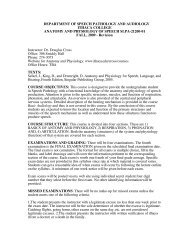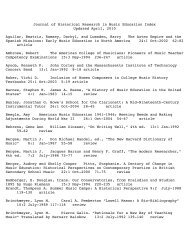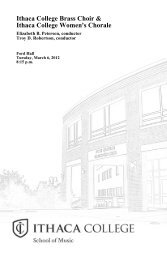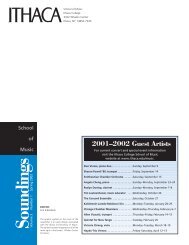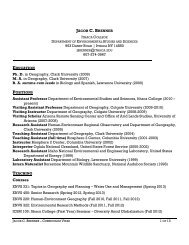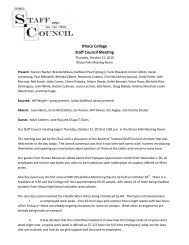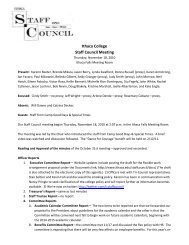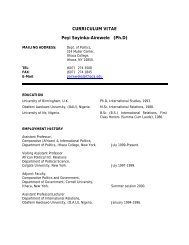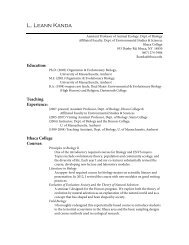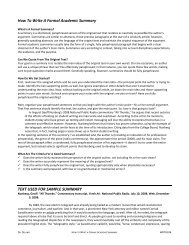A Brief Defense of Empiricism - Ithaca College
A Brief Defense of Empiricism - Ithaca College
A Brief Defense of Empiricism - Ithaca College
Create successful ePaper yourself
Turn your PDF publications into a flip-book with our unique Google optimized e-Paper software.
A <strong>Defense</strong> <strong>of</strong> “Naïve” <strong>Empiricism</strong> page 5 <strong>of</strong> 14<br />
information, or evidence apart from observation, empirical scientific investigations,<br />
and our sensory experience <strong>of</strong> the world, and we believe this on the basis <strong>of</strong> our<br />
empirical a posteriori experiences and our general empirical view <strong>of</strong> how things<br />
work. For example, we believe on empirical evidence that humans are continuous<br />
with the rest <strong>of</strong> nature and that we rely like other animals on our senses to tell us how<br />
things are. If humans are more successful than other animals, it is not because we<br />
possess special non-experiential ways <strong>of</strong> knowing, but because we are better at<br />
cooperating, collating, and inferring. In particular we do not have any capacity for<br />
substantive a priori knowledge. There is no known mechanism by which such<br />
knowledge would be made possible. This is an empirical claim.<br />
Granted, most <strong>of</strong> the evidence for the fundamental principle <strong>of</strong> empiricism is<br />
negative. Among this negative evidence is the fact that rationalists have never <strong>of</strong>fered<br />
any acceptable explanation for how human beings might get substantive a priori<br />
knowledge (or non-substantive a priori knowledge for that matter). Even such a<br />
friend <strong>of</strong> the a priori as Christopher Peacocke admits that there is no explanation for<br />
our supposed a priori knowledge <strong>of</strong> the propositions he <strong>of</strong>fers as examples:<br />
It is <strong>of</strong>ten clear that a proposition is a priori, while the nature <strong>of</strong> the<br />
justification or entitlement for belief in the proposition remains unclear. When this<br />
combination obtains, it is a task for a philosophical theorist <strong>of</strong> the a priori to<br />
explain what the justification or entitlement is.... The identification <strong>of</strong> the full<br />
nature <strong>of</strong> the entitlement that sustains a priori knowledge, as opposed to its<br />
existence, is an open question in almost all the domains mentioned above. (2005,<br />
p. 746)<br />
In the absence <strong>of</strong> such an explanation the a priori status <strong>of</strong> the claims is questionable<br />
at best. 9 “The domains mentioned above” consist <strong>of</strong> branches <strong>of</strong> mathematics and<br />
logic plus moral principles, principles <strong>of</strong> economics, metaphysical assertions, and<br />
claims about the impossibility <strong>of</strong> color sharing, and so on. If the best a friend <strong>of</strong> the<br />
substantive a priori can do is point to supposed examples <strong>of</strong> substantive a priori<br />
claims and admit that he has no explanation <strong>of</strong> how we come to them, then we can<br />
reasonably question his examples. In the same essay and elsewhere Peacocke gives<br />
what he calls a metasemantic account <strong>of</strong> a priority in which a priority is based on the<br />
possession conditions for concepts. Although he calls his position moderate<br />
rationalism, I do not see how this differs from versions <strong>of</strong> empiricism. An empiricist<br />
need not deny that concepts give rise to a priori propositions. Indeed, Peacocke<br />
insists that his view is consistent with Quinean naturalism, so I am inclined to view<br />
the dispute as partially terminological and not threatening to moderate empiricism. 10<br />
As further evidence <strong>of</strong> our lack <strong>of</strong> nonempirical sources <strong>of</strong> knowledge we can<br />
cite the fact that outside <strong>of</strong> the areas <strong>of</strong> mathematics, logic, and geometry, there is no<br />
agreement on any substantive claim that is independent <strong>of</strong> empirical sources <strong>of</strong><br />
knowledge. In the history <strong>of</strong> philosophy we have the spectacle <strong>of</strong> classical<br />
rationalists 11 asserting many propositions on the basis <strong>of</strong> their pure rational or<br />
philosophical insight and using this as support for their claim that humans have the<br />
capacity for pure rational insight while at the same time other rationalists disagree<br />
with them about almost everything they assert on this basis—except for the claim that<br />
what we conceive clearly and distinctly is true in the way we conceive it. The fact<br />
that philosophers and others have never been able to agree at all about a priori<br />
metaphysical claims is empirical evidence that we do not have the capacity for such<br />
knowledge that the rationalists claim we do.



